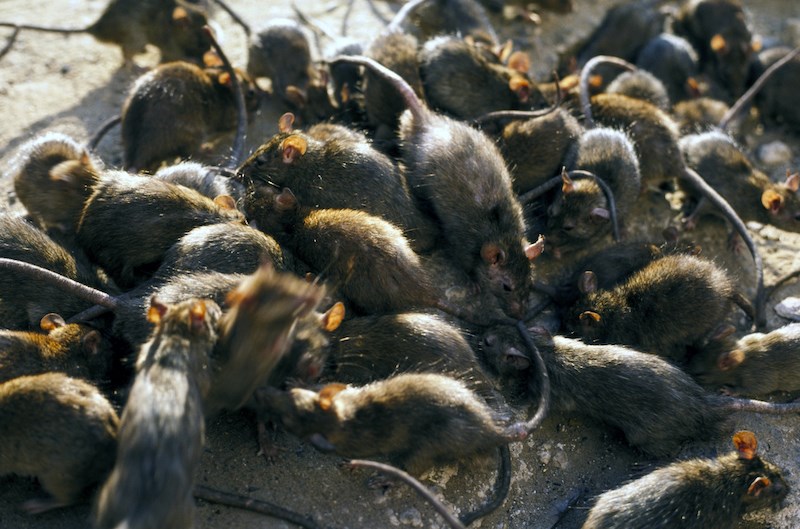In the last few years, Vancouverites have started to notice an increase in rats and mice. Prominent Metro Vancouver buildings like YVR, Rogers Arena and Bloedel Conservatory have all had reports of mice sightings, if not full-blown infestations.
"There's definitely an increase in issues across the board," says Mike Londry, president of Westside Pest Control LTD, confirming what residents have recently suspected: there is an increased presence of rodents in the Lower Mainland.
Just yesterday, he says, he was on-site with an important client in the midst of a frustrating mouse problem.
Similarly, he says a high-profile national chain store (he won't name names) is at its wits' end after using products that supposedly keep mice away and having already called in a well-known national pest control company to take care of their rodent problem. He estimates they had anywhere between 500 and 1,000 mice; within 30 seconds of being at their store, Londry recalls picking up a plastic tote that had a mouse in it eating pet food.
"Mice have always been one of the biggest challenges in our industry," explains Londry. Mice are indoor creatures that have been co-habitating with humans for tens of thousands of years, meaning they have developed to be very good at evading traps, which Londry says is contributing to the rise in the rodent population.
Rats are no different.
At a recent conference, Londry was shown a video taken by a pest control technician of a persistent rat he couldn't catch. The rat would push and nudge the trap to get it to spring so he could safely eat the food. It wouldn't go anywhere near the bait until the trap had snapped.
Mice, who are naturally neophobic (scared of anything new), according to Londry, hoard their food and will only go near bait if they have run out of their stash. They've also built up a resistance to certain types of rodenticides, he says.
Bans on rodenticides contributing to growing mice and rat problem
Having been in the industry for 17 years, Londry describes the current situation surrounding rodenticides as "concerning and alarming."
In the summer of 2021, the B.C. government tested an 18-month ban on rat poisons, known as second-generation anticoagulant rodenticides (SGARs), and in October 2022 made the decision to make the ban permanent.
"The regulation will prohibit the sale and use of SGARs in B.C. for all members of the public, and most commercial and industrial operations. Only select sectors deemed 'essential services,' such as hospitals and food production, will be able to purchase and use SGARs," reads the government news release.
Londry says he's fully supportive of exclusion and integrated pest management techniques but says the correlation between the new legislation and increased pest problem "is way too obvious." He points out that if a grocery store, which is deemed an essential service, is attached to another business which doesn't have the same distinction, like in a strip mall, the mice can spread from business to business and technicians are unable to use the same techniques within the same complex.
"You gave them a bracelet to an all-inclusive," he jokes. "They flew in with Sunwing and you're not leaving."
Despite the bans, Londry is still seeing certain products being used in the field that were a "no-go zone" for his company but he's sympathetic to people who are resorting to using them. "They're desperate, it's their livelihood," he says. "Their tools have been eliminated to the point where they're not seeing the same success."
However, he adds, "I understand the motive but I do not condone it in any way and am concerned that increased the use of long-time banned substances could lead to the harm of humans and pets. We have completely flipped. By trying to take 1 step forward, we have in many cases taken 7 steps back."
Pest control in 'a tricky phase'
The bans on rodenticides haven't had the same effect in residential spaces. Mice are able to squeeze through holes as small as six millimetres. However, if you're able to find and fill in the entry points, you can eliminate the problem quickly, he says.
There is, however, an uptick in infestations in multi-residential buildings. Pest control is more of "a joint effort now than it was before," says Londry. Before, people didn't have to care and companies could work around the clients. But between the new bureaucracy and mice-resisting baits, clients need to be as enthusiastically committed to the project as the technicians, he adds. People just aren't in apartment complexes, he says.
Londry has doubts about the current solutions being put in place. He says the people lobbying for rodenticide bans didn't work in pest control and calls some of the decisions made, such as excluding agriculture, "frustrating" and "mind-boggling."
He also thinks they are working with inaccurate data because only the people with use licences are required to report every use of poisons and are audited by the government while tens of thousands of technicians have application licences but aren't facing the same scrutiny. Homeowners are also travelling to the U.S. to purchase pesticide products banned in Canada, which isn't accounted for, he tells V.I.A.
"As an industry, we are constantly under the microscope," he says.
The bans were put in place to protect outdoor wildlife or accidents in the home with children and pets but Londry suggests that rodents are also "a real concern for human health."




